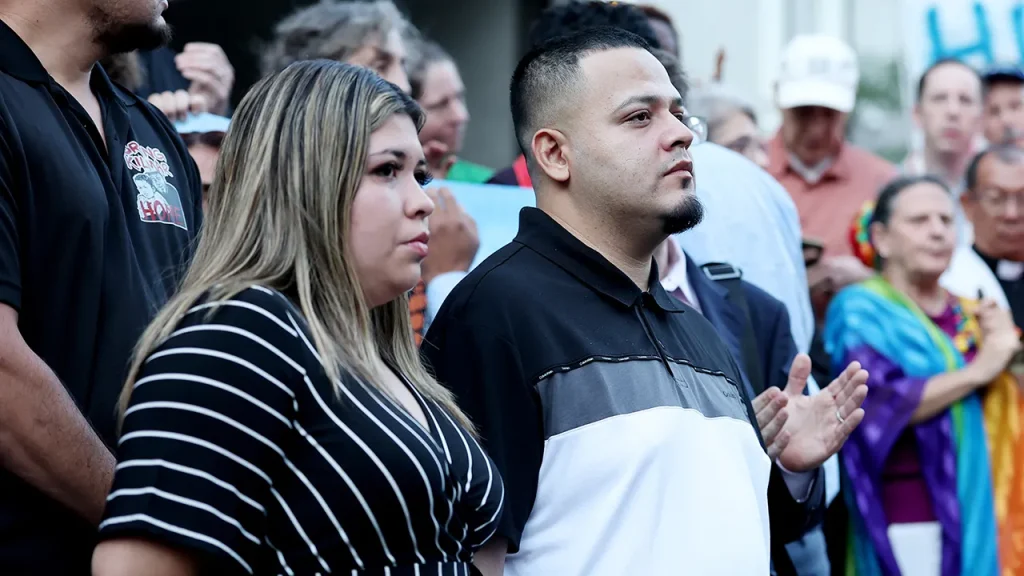Trump Administration Pushes for Deportation of Kilmar Abrego Garcia to Liberia
President Donald Trump’s administration has intensified its efforts to deport Kilmar Abrego Garcia to Liberia, filing a request with Federal Judge Paula Xinis to approve the deportation. In their filing, the Justice Department asserted that Abrego Garcia has failed to demonstrate that he would face persecution in Liberia, stating, “Petitioner’s claims are procedurally barred multiple times over and fail on the merits in any event.” This represents the administration’s second attempt to deport Abrego Garcia following his return from El Salvador earlier this year. The government maintains that Liberia has provided “sufficient and credible” assurances that Abrego Garcia will not face harm upon arrival, and is urging the court to dissolve its preliminary injunction that currently prevents his removal.
The case has become increasingly contentious, with Abrego Garcia’s legal team arguing that his due process rights have been violated. His attorneys contend that “the unreasoned determination of a single immigration officer—who concluded that Abrego Garcia failed to establish that it is ‘more likely than not’ that he will be persecuted or tortured in Liberia—satisfies due process. It does not.” This fundamental disagreement about the adequacy of the evaluation process highlights the tensions between immigration enforcement priorities and due process protections. Abrego Garcia’s legal team has emphasized that the rushed nature of the proceedings has prevented a fair assessment of the risks he might face if deported to Liberia, a country that was notably absent from his earlier list of over 20 nations where he claimed to fear persecution.
Further complicating the case, Abrego Garcia’s attorneys have alleged retaliatory prosecution by the U.S. government. They point to a revealing timeline: when the government received unfavorable rulings in Abrego Garcia’s civil case challenging his removal to El Salvador, they initiated criminal prosecution; when they received unfavorable rulings in the criminal case, they began third-country removal efforts. This pattern, his attorneys argue, suggests that the government’s actions are motivated by a desire to circumvent judicial oversight rather than legitimate immigration enforcement concerns. Adding another layer to this complex situation, Costa Rica has offered to accept Abrego Garcia with refugee status, but the U.S. has indicated it would only send him there if he pleads guilty to human trafficking charges—a condition his lawyers characterize as further evidence of improper pressure tactics.
The Department of Justice has emphasized Liberia’s status as “a thriving democracy and one of the United States’ closest partners on the African continent,” suggesting that concerns about persecution there are unfounded. This position aligns with the administration’s broader approach to immigration enforcement, which has prioritized expedited removals and restricted asylum claims. The government’s filing makes clear that they believe all legal requirements have been met to proceed with deportation to Liberia, despite Abrego Garcia’s objections. The case represents a test of the judiciary’s role in providing checks on executive immigration enforcement actions, particularly when questions of potential persecution are involved.
The ongoing legal battle reflects deeper tensions in American immigration policy regarding due process for non-citizens and the balance between enforcement priorities and humanitarian concerns. Abrego Garcia’s case has gained attention not only for its specific circumstances but also for what it represents about the systematic challenges facing immigrants in removal proceedings. His attorneys argue that fundamental procedural protections are being bypassed in the government’s rush to deport him, while the administration maintains that he has received appropriate legal consideration and failed to establish a legitimate claim to remain in the United States. The contrast between the government’s characterization of Liberia as a safe destination and Abrego Garcia’s fears highlights the subjective nature of persecution assessments.
As Judge Xinis considers the arguments from both sides, the outcome will have significant implications not only for Abrego Garcia but potentially for other cases involving deportation to countries not initially identified as threatening by asylum seekers. The government’s assertion that “this Court should therefore dissolve its preliminary injunction and permit the government to remove Petitioner to Liberia” frames the issue as a straightforward matter of law, while Abrego Garcia’s legal team portrays it as a complex case involving potential retaliation and insufficient procedural protections. The decision will test the judiciary’s willingness to intervene in executive branch immigration enforcement decisions when questions of potential persecution and due process are raised. Whatever the outcome, the case illustrates the human impact of immigration policies and the high stakes involved when individuals face deportation to countries where they claim to fear harm.















